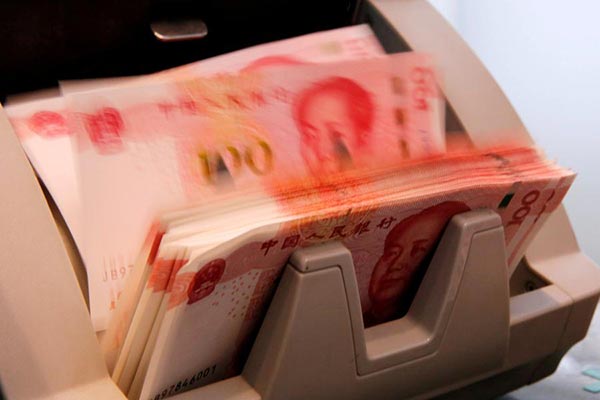China's financial regulators keep lid on emergent risks
 |
|
Chinese 100 yuan banknotes are seen in a counting machine while a clerk counts them at a branch of a commercial bank in Beijing, March 30, 2016. [Photo/Agencies] |
BEIJING - China's central bank and regulators for the stock, banking and insurance sectors are in full swing attempting to rein in rising financial risks.
The country's top stock market regulator Sunday denounced the "crocodiles" that prey on retail investors, vowing stricter regulation to prevent systematic financial risks.
The remarks came after the "barbaric" behavior of a number of Chinese insurers that were using leveraged money to buy shares in listed companies late last year, causing widespread public concern.
Accordingly, China's insurance regulator last week barred Yao Zhenhua, chairman of Foresea Life Insurance, from the insurance sector for 10 years for irregular market operations, while imposing measures to restrict stock trading of another insurer for one year for similar reasons.
The top banking regulator released guidelines last week to regulate the deposit business of online lenders to prevent cases of investors' money being stolen.
To regulate local government bond issuance, the Ministry of Finance urged local governments to issue bonds in a balanced manner throughout the year and improve information disclosure.
Earlier this year, the central bank tightened market liquidity in the interbank market, signalling a shift towards prudent and neutral monetary policy.
The government has to walk a fine line to keep the world's second largest economy steadily expanding while avoiding financial risks.
China faces eight major risk areas in the financial sector: bad loans, liquidity strains, bond defaults, shadow banking, external market shocks, property bubbles, government debt and online financing, according to Yang Weimin, a senior official with China's top economic policy-making office.
"Pressure for financial risk control is growing, with a possible US Fed rate hike and other external uncertainties," said Li Wei, director with the Development Research Center of the State Council. "Meanwhile, the ongoing de-leveraging of the economy and reform of 'zombie enterprises' might expose some financial risks."
At the annual Central Economic Work Conference in December, the central leadership pledged to make preventing financial risks a priority, saying that curbing asset bubbles would be more important in 2017.
Nevertheless, China has proven its mettle in dealing with past financial shocks. In the aftermath of global financial crises in 1998 and 2008, China held fast as an anchor of economic stability, even as many market stalwarts faltered.
China can avoid the worst yet again, according to a recent research note from Morgan Stanley citing three major factors.
Firstly, China's own savings have funded its debt build-up, which has gone into investment rather than consumption.
Secondly, the government enjoys strong net asset positions both domestically and externally, offering adequate buffers against shocks.
Thirdly, strong external macro positions, including a current account surplus, high levels of foreign currency reserves, and lack of significant inflationary pressures, leave China with plenty of leeway to manage domestic liquidity.
While China's financial market regulators are stepping up supervision, there is growing call for more reform of the current regulatory framework.
A recent survey of 1,794 Chinese bankers showed that over 40 percent believed that financial market supervision should take a macro-prudential view and focus more on functional regulation that would address supervision of cross-sector financial business.
Regulation capability and cross-sector coordination should be improved to prevent financial risks making bigger waves, analysts say.









